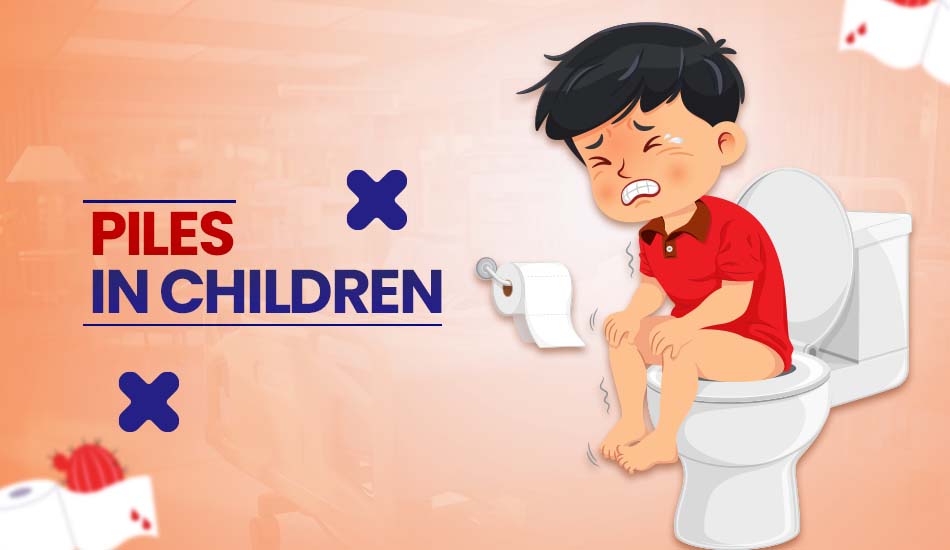
Piles in Children: Symptoms, Causes, and Treatments
Wednesday, 5th June 2024Piles, also known as hemorrhoids, are often thought of as an adult condition, but children can also develop them. Understanding the symptoms, causes, and treatment options for piles in children is crucial for parents and caregivers to manage this condition effectively.
Symptoms of Piles in Children
Children with piles may exhibit a variety of symptoms that can vary in severity. Common symptoms include:
- Pain or Discomfort: Especially during or after bowel movements.
- Itching or Irritation: Around the anus.
- Swelling: Lumps around the anus, which may be tender to touch.
- Bleeding: Bright red blood on toilet paper or in the toilet bowl.
- Leakage: Difficulty controlling bowel movements, leading to soiling.
Causes of Piles in Children
Several factors can contribute to the development of piles in children. These include:
1. Constipation
Constipation is a common cause of piles in children. Hard stools and straining during bowel movements can increase pressure on the rectal veins, leading to piles. Dietary factors, such as low fiber intake and inadequate hydration, often contribute to constipation.
2. Diarrhea
Frequent or prolonged diarrhea can also irritate the rectal area and cause piles. This is often due to infections, dietary issues, or food intolerances.
3. Prolonged Sitting
Children who spend long periods sitting, especially on hard surfaces or the toilet, are at risk of developing piles. Prolonged sitting can put pressure on the rectal veins, leading to swelling and irritation.
4. Genetics
A family history of piles can increase the likelihood of a child developing the condition. Genetic factors can influence the strength and elasticity of the veins in the rectal area.
Treatments for Piles in Children
Managing piles in children involves a combination of home remedies, dietary changes, and, in some cases, medical treatments. Here are some effective treatment options:
1. Dietary Changes
A high-fiber diet is essential for preventing and managing piles. Ensure your child eats plenty of fruits, vegetables, whole grains, and legumes. Encourage them to drink plenty of water to keep stools soft and prevent constipation.
2. Encourage Regular Bowel Movements
Help your child establish a regular bowel routine to prevent constipation. Encourage them to go to the toilet as soon as they feel the urge and avoid prolonged sitting on the toilet.
3. Warm Baths
Warm baths can help reduce discomfort and soothe the irritated area. Let your child sit in a tub filled with warm water for about 10-15 minutes several times a day.
4. Topical Treatments
Over-the-counter creams and ointments specifically designed for piles can provide temporary relief from itching and discomfort. However, always consult your doctor before using any medication on your child.
5. Gentle Wipes
Use gentle, unscented wipes instead of toilet paper to clean the area after bowel movements. This can help reduce irritation and discomfort.
6. Stool Softeners
If dietary changes are not enough to relieve constipation, your doctor may recommend a stool softener to make bowel movements easier. Always follow your doctor's advice regarding medication.
7. Medical Consultation
If home remedies and dietary changes do not provide relief, or if the piles are severe, it’s important to consult a healthcare professional. Your doctor can recommend further treatments or refer you to a specialist if necessary.
When to See a Doctor
While many cases of piles in children can be managed at home, it’s important to seek medical advice if:
- The pain or discomfort becomes severe.
- There is significant bleeding.
- Home treatments do not provide relief.
- Your child has difficulty controlling bowel movements.
Why Choose Shriram Hospital for Piles Treatment?
At Shriram Hospital, we understand the unique challenges of managing piles in children. Our experienced team provides compassionate and effective care tailored to your child’s needs.
Conclusion
Piles in children can be uncomfortable, but with the right treatment and care, symptoms can be managed effectively. For personalized and safe treatment options, consult the experts at Shriram Hospital.



